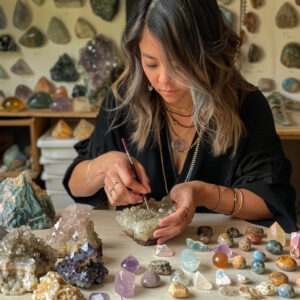Highlights
- Rusting, a common phenomenon associated with iron and its alloys, is an electrochemical process that occurs when iron reacts with oxygen in the presence of moisture.
- While onyx itself does not rust due to its chemical composition, external factors, such as harsh chemicals and excessive moisture, can potentially damage its surface and compromise its integrity.
- Onyx is commonly used in jewelry, carvings, countertops, tiles, wall panels, and various decorative elements, adding a touch of elegance and sophistication to different spaces.
The captivating beauty of onyx, with its rich hues and alluring patterns, has captivated humanity for centuries. However, one question that often arises among those considering onyx for their projects is, “Does onyx rust?” To unravel this mystery, let’s delve into the unique properties of onyx and explore the factors that influence its susceptibility to rust.
Understanding Onyx and Its Composition:
Onyx, a captivating gemstone and a variety of chalcedony, is primarily composed of silicon dioxide (SiO2). This mineral composition grants onyx remarkable hardness and durability, making it a popular choice for various applications, including jewelry, carvings, and decorative elements.
Rusting: A Chemical Reaction and Its Causes:
Rusting, a common phenomenon associated with iron and its alloys, is an electrochemical process that occurs when iron reacts with oxygen in the presence of moisture. This reaction produces iron oxide, commonly known as rust, which appears as a reddish-brown coating on the metal’s surface.
Onyx: Rust-Resistant by Nature:
Unlike iron and its alloys, onyx is composed of silicon dioxide, which lacks the chemical properties that facilitate rusting. Therefore, onyx itself does not rust. Its inherent composition shields it from the electrochemical reactions that lead to rust formation.
External Factors and Potential Risks:
While onyx is naturally rust-resistant, certain external factors can contribute to its deterioration or discoloration. Exposure to harsh chemicals, excessive moisture, and abrasive cleaning agents can compromise the integrity of onyx surfaces, potentially leading to etching, staining, or dulling.
Caring for Onyx: Preservation and Maintenance:
To preserve the beauty and longevity of onyx, proper care and maintenance are essential. Regular cleaning with mild, non-abrasive detergents and soft cloths can help prevent the accumulation of dirt and grime. Additionally, avoiding exposure to harsh chemicals and excessive moisture can minimize the risk of surface damage.
Applications of Onyx: Exploring Its Versatility:
Onyx finds its way into various applications, including:
1. Jewelry: Onyx’s captivating appearance makes it a popular choice for crafting elegant jewelry pieces, such as necklaces, rings, and earrings.
2. Carvings: Onyx’s hardness and intricate patterns lend themselves beautifully to intricate carvings, creating unique decorative items and sculptures.
3. Decorative Elements: Onyx’s alluring hues and patterns make it an ideal material for decorative elements, such as countertops, tiles, and wall panels.
Final Note: A Rust-Resistant Gemstone with Proper Care:
In essence, onyx, with its inherent composition, is naturally resistant to rust. However, external factors, such as exposure to harsh chemicals and excessive moisture, can compromise its integrity and potentially lead to deterioration or discoloration. With proper care and maintenance, onyx can maintain its beauty and elegance for years to come, captivating hearts and enhancing spaces with its timeless allure.
Information You Need to Know
1. Is onyx completely immune to rust?
Answer: While onyx itself does not rust due to its chemical composition, external factors, such as harsh chemicals and excessive moisture, can potentially damage its surface and compromise its integrity.
2. How can I clean onyx surfaces effectively?
Answer: Regular cleaning with mild, non-abrasive detergents and soft cloths is recommended to prevent the accumulation of dirt and grime. Avoid using harsh chemicals or abrasive cleaning agents, as they can damage the onyx’s surface.
3. What are some common applications of onyx?
Answer: Onyx is commonly used in jewelry, carvings, countertops, tiles, wall panels, and various decorative elements, adding a touch of elegance and sophistication to different spaces.
